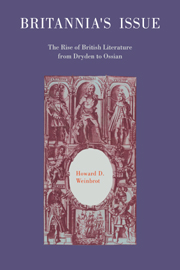Book contents
- Frontmatter
- Contents
- Acknowledgments and editorial notes
- INTRODUCTION: An overview of scope and method
- PART I CONTEXTS: INTELLECTUAL, PSYCHOLOGICAL, AND NATIONAL
- PART II TEXTS WITHIN CONTEXTS. ESSAYING ENGLAND: OUR GENIUS, OUR CLIME
- PART III GROWING ONE'S OWN. THE BRITISH ODE FROM COWLEY TO GRAY
- PART IV EXPANDING THE BORDERS. JEWS AND JESUS: THIS ISRAEL, THIS ENGLAND
- PART V CELTS, GERMANS, AND SCOTS: TOWARDS A UNITED KINGDOM
- Prologue to Part V
- 13 CELTIC SCOTLAND
- 14 OSSIAN IN SCOTLAND, GREAT BRITAIN, AND MODERN EUROPE: JOINING BRITANNIA'S ISSUE
- 15 CONCLUSION. SYNTHESIZING ALL THE NATIONS UNDER HEAVEN
- APPENDIX: The text of Handel's “Israel in Egypt”
- Index
Prologue to Part V
Published online by Cambridge University Press: 15 December 2009
- Frontmatter
- Contents
- Acknowledgments and editorial notes
- INTRODUCTION: An overview of scope and method
- PART I CONTEXTS: INTELLECTUAL, PSYCHOLOGICAL, AND NATIONAL
- PART II TEXTS WITHIN CONTEXTS. ESSAYING ENGLAND: OUR GENIUS, OUR CLIME
- PART III GROWING ONE'S OWN. THE BRITISH ODE FROM COWLEY TO GRAY
- PART IV EXPANDING THE BORDERS. JEWS AND JESUS: THIS ISRAEL, THIS ENGLAND
- PART V CELTS, GERMANS, AND SCOTS: TOWARDS A UNITED KINGDOM
- Prologue to Part V
- 13 CELTIC SCOTLAND
- 14 OSSIAN IN SCOTLAND, GREAT BRITAIN, AND MODERN EUROPE: JOINING BRITANNIA'S ISSUE
- 15 CONCLUSION. SYNTHESIZING ALL THE NATIONS UNDER HEAVEN
- APPENDIX: The text of Handel's “Israel in Egypt”
- Index
Summary
England and Scotland become a united Great Britain in 1707. This wedding bears some sweet and much bitter fruit until the aftermath of 1746, when the last Jacobite insurrection drowns in Culloden's blood. That catastrophe evokes hostility on each side, but after passions cooled each also began a process of assimilation, cleansing, and redefinition of its costly new nation. Some of that definition was based on the Hebraic or anti-classical strains so foreign to neoclassical hypotheses.
For example, the Celts in general and the Scots in particular often were associated with the Jews. According to a widely held theory, the great Celtic peoples were offspring of Noah's grandson Gomer who, presumably with Mrs. Gomer's help, peopled all of Europe and parts of Asia Minor. They of course spoke Hebrew, which gradually evolved into Celtic. These nations were guided by the Druids and their Bards, a learned, legislating, and oral priestly class especially distinguished in Britain. The Druids gained their wisdom from fortuitous meetings with Hebrew patriarchs like Abraham who also shared Jewish religious rituals. Alternatively, the first settlers in Britain included the Phoenicians who came to trade for tin in Cornwall and stayed to establish their own great eastern culture in western and central Britain. This Semitic people may have been Jews and certainly spoke Hebrew. Whether on divine or secular schemes British Celtic ancestry was Hebraic, unclassical and often anti-classical.
This intense connection to an inspired history and language helps to explain the special imaginative qualities of the Celtic language and nations. It also helps to make Celts and other Scots more attractive to south Britons.
- Type
- Chapter
- Information
- Britannia's IssueThe Rise of British Literature from Dryden to Ossian, pp. 477 - 480Publisher: Cambridge University PressPrint publication year: 1993



